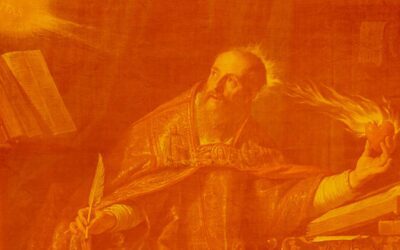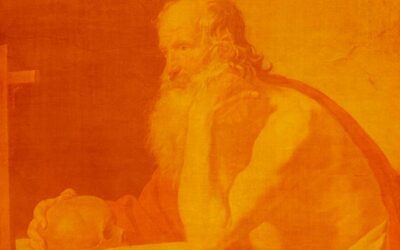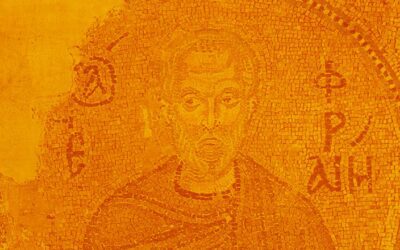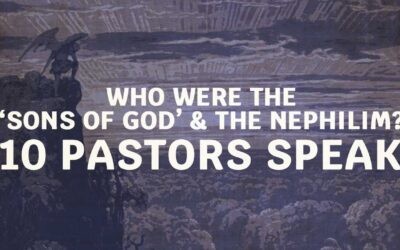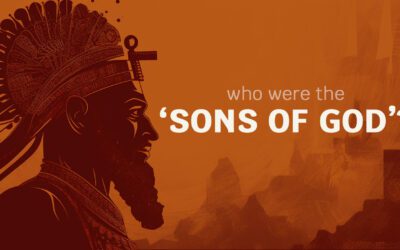What does the Apostle PETER Say about Disobedient Angels before the Flood?
Peter references imprisoned spirits and disobedient angels in his two epistles, and he uses the same terminology that other writers used to describe the account that originated in Genesis 6:1-4.
When taken individually and without considering the terminology of other books that were available at the time (Enoch, Jude, etc), some have argued that neither of these passages confirms that Peter believed that the ‘sons of God’ were angels that sinned with human women.
However, when taken in the context of the time, such an assertation seems untenable.
THE STORY OF THE DISOBEDIENT ANGELS IN PETER’s Epistles
1 Peter
For Christ also suffered once for sins, the righteous for the unrighteous, that he might bring us to God, being put to death in the flesh but made alive in the spirit,
19 in which he went and proclaimed to the spirits in prison,
20 because they formerly did not obey, when God’s patience waited in the days of Noah, while the ark was being prepared, in which a few, that is, eight persons, were brought safely through water.
21 Baptism, which corresponds to this, now saves you, not as a removal of dirt from the body but as an appeal to God for a good conscience, through the resurrection of Jesus Christ,
22 who has gone into heaven and is at the right hand of God, with angels, authorities, and powers having been subjected to him.
1 Peter 3: 18-22
2 Peter
1 But false prophets also arose among the people, just as there will be false teachers among you, who will secretly bring in destructive heresies, even denying the Master who bought them, bringing upon themselves swift destruction.
2 And many will follow their sensuality, and because of them the way of truth will be blasphemed.
3 And in their greed they will exploit you with false words. Their condemnation from long ago is not idle, and their destruction is not asleep.
4 For if God did not spare angels when they sinned, but cast them into hell [Greek: Tartarus] and committed them to chains of gloomy darkness to be kept until the judgment;
5 if he did not spare the ancient world, but preserved Noah, a herald of righteousness, with seven others, when he brought a flood upon the world of the ungodly;
6 if by turning the cities of Sodom and Gomorrah to ashes he condemned them to extinction, making them an example of what is going to happen to the ungodly;
7 and if he rescued righteous Lot, greatly distressed by the sensual conduct of the wicked
8 (for as that righteous man lived among them day after day, he was tormenting his righteous soul over their lawless deeds that he saw and heard);
9 then the Lord knows how to rescue the godly from trials, and to keep the unrighteous under punishment until the day of judgment,
10 and especially those who indulge in the lust of defiling passion and despise authority.
2 Peter 2:1-10 (ESV)
Who are the Spirits in 1 Peter?
In both of Peter’s epistles, he references events involving spirits/angels that had been imprisoned for their disobedience during the time of Noah.
Both passages are clearly referencing the same event that Jude refers to:
And the angels who did not keep their positions of authority but abandoned their proper dwelling—these he has kept in darkness, bound with everlasting chains for judgment on the great Day.
JUDE 6 – 7
In a similar way, Sodom and Gomorrah and the surrounding towns gave themselves up to sexual immorality and perversion. They serve as an example of those who suffer the punishment of eternal fire.
According to Matthew Boffey’s article on this topic:
“Spirits” in the NT always refers to nonhuman spiritual beings unless qualified…
Matthew Boffey logos.com
The Influence of Outside Sources on Peter’s Choice of Words
Although some have argued that these verses can be explained as the spirits of disobedient humans or of angels that fell at a different time than the Genesis 6 event, these explanations fall short in that they don’t address that Peter and Jude and their readers were familiar with the Book of Enoch and the views of other historians and philosophers of their time on this topic.
Peter and Jude were not accidentally using the same terminology. The Book of Enoch is known to be at least as old as 200 – 100 BC, predating Peter’s epistles by at least 150 years.
Plus, only within a few years of Peter’s writings, Josephus and Philo both wrote about how Genesis 6 described the sin of angels with women. And in the years to directly follow, many early church fathers did as well.
When you look at the context of the full passage in 1 Peter, it’s obvious that there would be more subtle hints that Peter was referencing the well-known story of the sin of the angels. Take a look…
| The Tale of the Angels that Sinned with Women | 1 Peter |
| Angels appeared among men | But false prophets also arose among the people |
| bringing forbidden knowledge | who will secretly bring in destructive heresies, |
| They were imprisoned in Tartarus for it | bringing upon themselves swift destruction |
| They lusted for women and took as many as they wanted | And many will follow their sensuality |
| They lusted for women and brought forbidden knowledge | And in their greed they will exploit you with false words. |
| They left their ‘rightful place’, disregarding the authority of God, and engaged in lustful passions. | especially those who indulge in the lust of defiling passion and despise authority |
Comparing Peter’s Story with Enoch and other sources
And Peter and Jude both borrow the same terminology that the Book of Enoch uses to describe the sin of the angels. Below is a comparison of the terminology. It’s quite a stretch to insist that Peter and Jude were somehow unaware of the wording they were using…
| Genesis 6 | 1 Peter | 2 Peter | Jude | Enoch 1 | Josephus |
| When man began to multiply on the face of the land and daughters were born to them, | And it came to pass when the children of men had multiplied that in those days were born unto them beautiful and comely daughters. | Now this posterity of Seth continued to esteem God as the Lord of the universe, and to have an entire regard to virtue, for seven generations; | |||
| the sons of God saw that the daughters of man were attractive. And they took as their wives any they chose. | For if God did not spare angels when they sinned, | And the angels who did not keep their positions of authority but abandoned their proper dwelling— | And the angels, the children of the heaven, saw and lusted after them, and said to one another: ‘Come, let us choose us wives from among the children of men and beget us children.’ | For many angels of God accompanied with women, | |
| The Nephilim were on the earth in those days, and also afterward, when the sons of God came in to the daughters of man and they bore children to them. These were the mighty men who were of old, the men of renown. | And they became pregnant, and they bare great giants, | and begat sons that proved unjust, and despisers of all that was good, on account of the confidence they had in their own strength; for the tradition is, that these men did what resembled the acts of those whom the Grecians call giants. | |||
| he went and proclaimed to the spirits in prison, because they formerly did not obey, when God’s patience waited in the days of Noah, while the ark was being prepared, | but cast them into hell [Greek: Tartarus] and committed them to chains of gloomy darkness to be kept until the judgment; | these he has kept in darkness, bound with everlasting chains for judgment on the great Day. | bind them fast for seventy generations in the valleys of the earth, till the day of their judgement and of their consummation, till the judgement that is for ever and ever is consummated. |
It’s clear that Peter took it for granted that the sons of God in Genesis 6 were indeed angels that had sinned and were punished severely for it.
If Peter Believed Angels Sinned in Genesis 6… Now what?
So what does this mean for us? Just because Peter uses similar terminology as the Book of Enoch, does this indicate that the Book of Enoch is really an accurate elaboration on the events of Genesis 6?
On the contrary, it simply means that Peter believed that the ‘sons of God’ were angels and that God had punished them for their sins.
He chose to reference that event in terms his readers would be familiar with. And he makes no further comment on the proliferation of books that told the story in more detail.
What did other early church writers say?
Several Second Temple period authors elaborated on this story, and each one varies in many details.
Peter is not saying that any of those are valid and historically accurate, but that the general concept is one that he accepts as true.
More info
1 Peter 3: Who Are the Spirits in Prison? Peter David Summarizes (logos.com)

